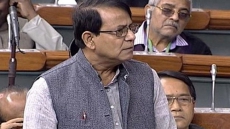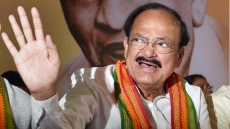Since 2014 when Narendra Modi won his famous victory, the only change has been a marginal decline in his popularity. Otherwise, his other advantages and disadvantages have remained more or less the same.
As a result, a clear-cut prognosis of the future is not possible for it is difficult to assess how the gains and losses will pan out.
For instance, the political benefits which accrue to Modi from having weak opponents are likely to remain unchanged. It was this advantage which helped him to win in the first place.
Since then, little has changed so far as the Congress is concerned, for the Bharatiya Janata Party's (BJP) main adversary is still tethered to its feudal traditions which are unappealing, if not positively offensive, to a large section of the voters, especially the middle class.
The main drawback of feudalism is that it is seen as antithetical to modernity. Its emphasis is on an anti-industrial, rural way of life. Much of Modi's appeal lies in his success in projecting himself as pro-development which, in today's world, translates into a vision of industrial growth.
Since the Congress's scuttling of the Modi government's amendment of the land law comes in the way of acquiring land for industries, it shows that the party wants India to remain primarily agricultural, which has a connotation of backwardness.
In addition, the Congress's longstanding baggage of corruption has been reinforced by the solar panel scam in Kerala where the party's chief minister, Oommen Chandy, is involved.

It is not only the Congress which panders to the "India lives in its villages" outlook; others like the parties of the Hindi heartland - the Janata Dal (United), the Rashtriya Janata Dal (RJD) and the Samjwadi Party (SP) - also have a similar mindset.
Although they ostensibly favour investments in their states, this is no more than a token gesture, for neither the law and order situation nor the infrastructure offers any incentive to potential entrepreneurs.
To make matters worse, both the Bihar and U.P. governments have expressed their preference for introducing quotas in the private sector companies which will be a surefire way of destroying their viability as profit-making enterprises.
The quotas will undoubtedly be grabbed by the backward castes who constitute the main supporting bases of the Janata Dal (United) and the SP. It is to keep them in good humour that the two ruling parties are following this palpably anti-development path.
Of the BJP's two major opponents in north India, where it is more influential than in the east or south, the Congress is feudal and the Hindi heartland parties are casteist. Both seem to prefer the earlier centuries, as the SP's one-time opposition to English and computers showed.
The BJP, too, used to look towards the medieval ages for inspiration in the 1990s. But not now under Modi although there are sections in it - the so-called fringe elements - who still live in the days of the Ramjanmabhoomi movement.
There is little doubt that they diminish Modi's appeal despite his efforts to control them. To an extent, he has succeeded in curbing the enthusiasm of, say, Yogi Adityanath for ghar wapsi and of Sakshi Maharaj for Nathuram Godse.

Even the Bajrang Dal has said that it will not engage in moral policing targeting courting couples on Valentine's Day.
But there are still elements like a Haryana minister who says that there is no place for beef-eaters in his state and an M.P. in Madhya Pradesh who is stoking communal tension by insisting that Hindus will not share space with the Muslims while offering prayers in the Bhojshala shrine which is sacred to both the communities.
Apart from acting more firmly against these elements, what Modi needs is a major electoral boost. After the initial bull run following the 2014 victory with wins in Maharashtra, Haryana, Jharkhand and Jammu and Kashmir, the defeats in Delhi and Bihar have taken the wind out of his sails.
To recover his political poise, he has to win in Assam, which is his best chance. As of now, however, one cannot be certain, especially if the Congress reaches an understanding with the United Democratic Front of the perfume baron, Badruddin Ajmal, to secure the Muslim vote.
Notwithstanding all these uncertainties, Modi's plus point remains his progressive outlook with the vision of a modern, industrial India of bullet trains and smart cities.
Neither feudalism, nor casteism can dent this appeal, especially for the younger generation of all communities who realize that the concept of the patronizing mai-baap sarkar which favour doles and handouts over self-help, entrepreneurial endeavours is passe.
Not since Jawaharlal Nehru's "dams are the temples of modern India" comment and Narasimha Rao's opening up of the economy has there been an Indian leader who is in tune with the modern world. Rajiv Gandhi also had such an attitude, but he did not live long enough to fulfil his promise.

Since Modi is a successor of the earlier modernizing prime ministers, there is still considerable goodwill for him. The support for him will increase exponentially if only he cracks down on the Hindutva hardliners.


